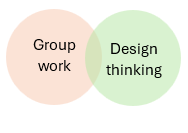Business ethics and social responsibility helps to offer more insights on the responsibility aspects of being an entrepreneur. You will learn how to take a broad perspective on the societal and environmental aspects since they are becoming increasingly as important for customers as a sound technical/ business solution.
Bachelor
JBG000 - Data science ethics – 5 ECTS – Q3 – Introductory
The relevance of ethics content to the practice of data science will be central, with an emphasis on multidisciplinary, responsibility to stakeholders, and how to use resources and methods to anticipate ethical and legal issues while creating social value. Case studies are used in this course.

1ZK20 - Sustainability perspectives on product innovation – 5 ECTs – Q3 – Advanced
To be successful, new products have to increasingly also present solutions to societal challenges such as climate change, environmental pollution, shortage of resources and excessive inequality. In this course, you will learn which possibilities exist and which actions can be taken within and beyond the product development process to achieve socially and ecologically more sustainable and simultaneously profitable product innovations.
Master
0LM150 - Entrepreneurship and corporate social responsibility – 5 ECTS – Q4
The course is divided into two parts. In the first part we clarify the hazard to which business ethics is a response and to identify the idea of conscience in relation to corporate culture. We will examine the role of moral reflection (conscience) in the lives of each of us as individuals and the corresponding role it plays in the culture of an organization. The second part focuses on the application of the conceptual foundations laid in the first part. Especially attention will be paid on the moral agenda of leadership, ecological responsibilities, and globalization.

0FC05 - Ethics of technology – 5 ETCs – Q1
E-voting machines, surveillance cameras, weapons, and faulty bridges all raise ethical questions. Can technology itself be ethical or unethical? Are engineers responsible for what others do with the technologies they design? To what extent should engineers avoid risks? In this course students learn to use philosophical theories and concepts to address the ethical aspects of technology. Specific methods for incorporating ethics into technology design are discussed and critically evaluated.

0LM130 – Ethics and the risk society – 5 ETCs – Q4
We live in a world where we increasingly control and know about the risks imposed on ourselves and others, in technological development, global health, the economy and the environment. You will develop an analysis of risk through the examination of cases such as environmental risks and sustainability, the nuclear power industry, and terrorist threats linked to new technologies. Students will learn to apply their analyses to new cases.